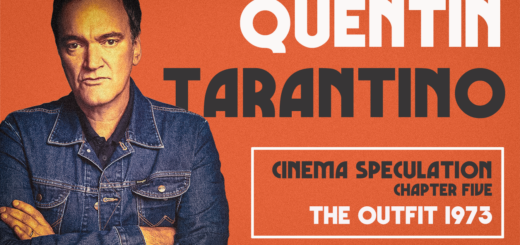Quentin Tarantino’s Pulp Fiction: A Movie Based On Nihilism

Pulp Fiction, an all-time cult classic, contains in itself a lot of metaphysical truths. Dig deeper into the movie than ever before with this guest article by Julien Josset, founder of La-Philosophie.com:
Nihilism is derived from the latin word Nihil, which means nothing. Nihilism itself refers to the philosophy which asserts the fact that life itself is particularly useless and holds no particular meaning in it whatsoever. When Nietzsche in his work Thus Spoke Zarathustra and The Antichrist claimed about the death of God, he referred to the society that has drifted away from its Judeo-Christian essence. God is dead and there is no substitute of a godless world. Its absence left a deep scar in the existence of man itself beckoning people to reason and logic as the scientific revolution begin to find its loftiness in our world. With the absence of religion, lives, in particular, seem to have no utter value and that there is no set of criteria which is bound to make us any less good or worse.
Quentin Tarantino’s Pulp Fiction is a strange and yet an interesting movie. It seems to have been arranged in a kind of a puzzle which speaks from the perspective of everyone in the film. While it may be considered a Crime Classical, there are no signs of law and order to be found. Everyone found in the movie seems to possess a certain trait in them: the mysterious black mobster with a bandage on the back of his head; sexual perverts portrayed as hillbillies; henchmen wearing black suits discussing fast food items; and a mobster in tuxedo attending party. But while these characteristics refer to the actors in the movie, what exactly does the movie say? In general and simple words, the movie refers to the American Nihilism.
Butch (Bruce Willis) and Jules (Samuel L. Jackson) are the foci of attention in the movie. The movie starts as Vincent (John Travolta) arrives to the US from Europe and Jules and Vincent appear to have a conversation about fast food and TV things and how different they are in Europe, such as Big Mac and Quarter Pounder; television references such as Arnold from the Green Acre and Fonz from Happy Days. This may seem like a comic relief but this silly and light conversation leads to a violent and unforgiving picture of these two characters that will be seen later on. But it must be focused that all this conversation refers to the absence of the pop culture and symbolism of the 20th century USA. This also refers to the fact that life itself is beyond all these worldly and superficial values and this void, this absence itself can be found in the late 20th century America, especially in the personalities of Jules an Vincent. This is can be largely seen when Vincent and Mia (Uma Thurman) visit Jack Rabbit Slim’s, where the popular artists and musicians are seen as ordinary people in any restaurant, such as Ed Sullivan being the host; Ricky Nelson the singer; Buddy Holly the waiter and Marilyn Monroe and Jane Mansfield the waitresses.

One of the famously used passages from the movie refer to righteous man who is addressed as the shepherd and is willing to help anyone who is lost in the valley of darkness. As sound and righteous it may seem, the other side also suggests that it can be provoked if evil intends to poison its followers.
The path of the righteous man…. and you will know my name is The Lord when I lay my vengeance upon thee.
The quote is used by Jules before he kills someone. The quote refers to a guide which suggests how one should live by morals and ethics – ironically this is absent from Jules’ life itself and becomes null to him. Jules later states that he never gave it attention and was just something he said before he killed someone.
Without a frame reference of any kind; with no ability to judge things based on their own personal judgment, Vincent and Jules were doing all that was being passed by Wallace. Things, events, and thoughts hold meaning only Wallace wants them to be so and his henchmen oblige. Whatever it is that Wallace would order, the henchmen were to make it done no matter what. This can be perfectly described by the mysterious briefcase which Jules and Vincent are to return. It’s perfectly mysterious because never in the film not once the content of the briefcase were revealed. Questions have speculated about the contents present in the briefcase but the answer, in fact, is that it is not important. What truly matters is that both men want it regardless of what it may have. Had Jules and Vincent had any curiosity or any determination for themselves to actually see what is in it, they would have been sane enough to see what particular actions are necessary and valid to acquire the briefcase. With this curiosity absent, the retrieval of the briefcase is the only thing what truly matters to Jules and Vincent even if they have to brutally treat anyone.
It appears that nihilism is the adequate substitute of religion in terms of morality and objective values. That is being said so because that is what Tarantino appears to create in the movie. Nihilism can be viewed as one of the principles of Aristotelian philosophy. Aristotelians suggest that things have in them an essence and for anything to achieve its best is to realize its own essence or worth. There are traits associated with living beings which help develop the best of what they hold: Humans consist of many abilities which we learn through the passage of time such as playing musical instruments, the writing, playing sports etc. But the most essential and important ability humans hold is its ability to reason which is the key factor in separating us from the rest of the living creatures. The best life for any human being is considered to be the fact that one realizes his/her capacities and most importantly the capacity to reason. This notion of the highest good or the best life along with Aristotle’s concepts may very well produce the framework in which one can find a purpose or meaning to one’s life. This kind of framework is absolutely devoid in the lives of Vincent and Jules. With the absence of such framework, pop culture seems to be the only mode of communication, reference, and symbols, and what truly moves the lives of these two individuals is Wallace who appears to dictate the necessity and importance of things. This supreme authority can be also be observed in the absence of police or any other law enforcement authorities. It is quite vague for a crime based movie where excessive is taking place and there is no sign or clue of any law enforcement whatsoever. This signifies the objective importance of Wallace and his stronghold in the theme of the movie. However, there is one small exception which will be seen later on.

The movie also shows the transformation of Jules. Having missed the bullet that was shot at Jules from a very short distance, Jules felt the change of heart. That event of having missed the bullet wasn’t seen so much as the divine intervention but make him realize what is not present in his life. All this makes Jules consider the biblical passage that he has been using for years. It makes him realize the objective framework of value and meaning that is nowhere in his life. With that being stated, Jules tells Vincent that he will no longer remain in the mob and goes on to share the passage with Ringo.
There are several explanations for the passage. The first conforms with his own lifestyle that irrespective of what he does, it is all understandable and not anywhere open to criticism because of Wallace and his authority. The other reveals that he wishes to wander the earth with a reference to the TV show Kung Fu, not to mention how vile and sinister the world can be. He now finds himself to be the opposition of evil, The Shepherd as he remarked. But that is not quite the truth, he finds out. He realizes that he himself was the bane that he has been preaching about for years. Ringo is feeble. Jules know that he is not quite the one with the attitude of the bane but is also lost from the righteous path and Jules wants to guide him. After Ringo had taken away everyone’s wallet, he is asked by Jules to return everyone’s wallet and take fifteen hundred dollar from his wallet.Jules specifically refers to this task as buying Ringo’s life. Ringo is later told to leave or else he will be killed. Vincent did not approve of this and told Jules that he would have shot him on the general principle.
This principle highlights whatever means are necessary to get the job done must be taken into consideration no matter what, the same principle that has been used by both individuals in their past. This attitude is explicitly seen in his reaction to Mia’s overdose. Vincent does all he can to save her not because she is a human being but because Mia happens to be the wife of his boss. Mia herself holds no significant value but only that she is related to Marcellus.
The other transformation is that of Butch. There is no certainty as to what is the exact purpose of all the violence that is going on in the film. The murders committed were clearly unjustified and had no reason to them whatsoever; such as the case of Marvin who is only shot in face because of the car and how it went over the bump, not to mention the damage that was inflicted to Antwan Tony Rocky Horror by Marsellus. Again, this is Marcellus who is offering justification and meaning to everything, similar to Gods who are hidden from us (Perhaps this is what refers to the bandage that does not offer to heal but is working as a disguise for the things which are not meant to be seen.) The lack of justification can be observed when Butch kills the boxer (because he refused to obey to the bookies that told him to lie down). When the cab driver informs him of this, Butch is not bothered. When Butch gets in the heat for double-crossing Marsellus, he does that by deciding to become his enemy and become equally ruthless. He does that by killing Vincent and trying to Kill Wallace by running him over with a car.

The situation becomes strangely interesting when both Butch and Wallace find themselves in an awkward and unpleasant situation. At one point they were eager to annihilate one another, they are facing the same situation as they are gagged by a bunch of hillbillies who want to punish and rape them. Notice the absence of the law enforcers in the movie and here one of the hillbillies, Zed, is dressed up in a security guard’s uniform while Wallace is gagged and bound. In the nihilistic perspective where there is no context of deciding what is evil or noble, the fact that there are no clear definitions of right or wrong, the legislator, the authority himself, Wallace is now strangled and at the mercy of this hillbilly as he is raped by the hillbilly with a shotgun in his hand.
Whereas Jules faced his transformation by missing the bullet, Butch faced it in a different manner as he returns to save the person who once intended to kill. As stated before, the violence is solely gratuitous and is without purpose (referring to Andre Gide ‘acte gratuit’), except when Butch returns to save Marcellus, the violence appeared to have a reason and justification: as an act of honor and friendship. Saving Marcellus, once his enemy, from men worse than themselves. Butch finds his redemption not by eliminating Marcellus but by saving him.
Butch had four weapons to pick and he chose the oddest one, the Samurai sword and not the chainsaw, baseball or the hammer. But why the sword? Why the foreign weapon? Perhaps the sword was not American while the others were. The weapons represented the nihilism while the sword represented a culture, a form of an objective framework which was devoid in the lives of all the characters. The sword is what the biblical passage is for Jules: a glimpse beyond pop culture; a glance beyond the abyss of nihilism, beckoning to life; a manner of thinking and perceiving with moral grounds and objectivity.
The sword is not what is seen as a traditional offering that is given to the American people and their generation. Here it is the gold watch which is related to Butch. To think how that watch got passed down, Butch’s great-grandfather buys it in Knoxville before joining the World War I. He passed on to his son and the son passes on to his son before entering the World War II and is then killed. Butch’s father was imprisoned in Vietnam and had to hide the watch in his rectum. His father however dies from dysentery. The manner in which the watch is presented to Butch is clearly significant. Seeing how the watch was hidden, it is clear that why it was referred to as the piece of shit; or just empty and devoid. But why was it like that? The same reason why the biblical passage empty: There is no referent to the symbol. That to which it refers is absent.
He now returns and is bound by a certain fate of doom. He needs to get his watch back. He returns to save Marcellus to be redeemed of the void which nihilism had put him in. Having done all that he wishes to return to Knoxville where the whole saga of the gold watch began so that he could return to his roots and join the generation of warriors.
Julien Josset, Founder of La-Philosophie.com (Twitter). BluRay screenshots credit: Screenmusings












